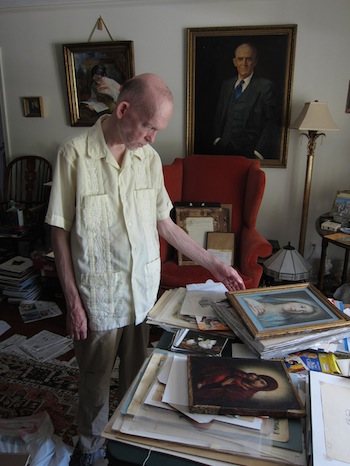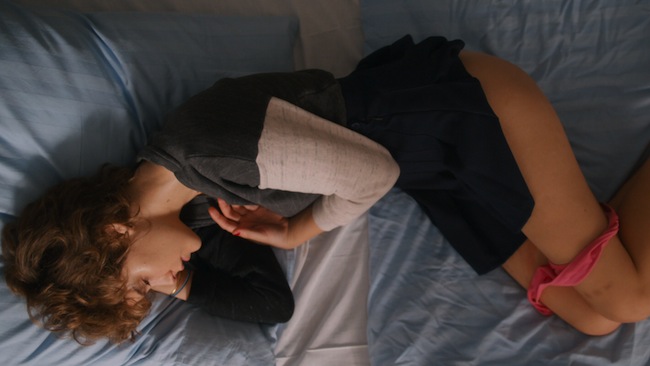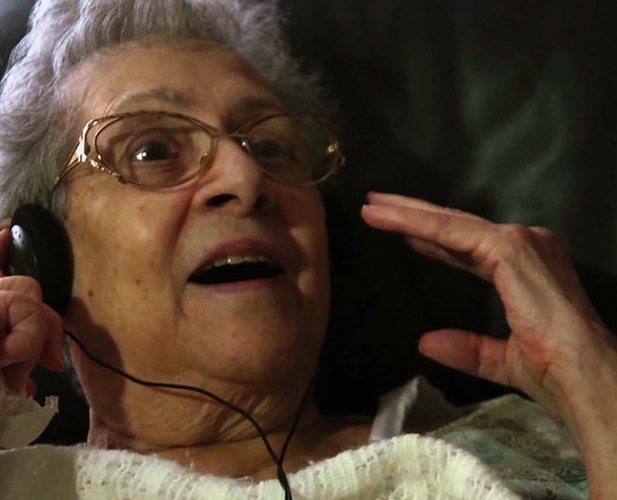Fuse Film Review: The 2014 Provincetown International Film Festival — A Sampling
Alive Inside, the winner for Best Documentary at the Festival, had the audience gasping and in tears.
by Tim Jackson
As expected, the 2014 Provincetown International Film Festival did a fine job of bringing to the friendly Cape audiences films that explore gay and gender issues, commercial indies that will soon be released, and documentaries with strong humanistic themes. Saturday night they presented David Cronenberg with the Filmmaker on the Edge Award and Debra Winger with the Faith Hubley Career Achievement Award.
In the actress’ interview with critic Ruby Rich, Winger displayed her quick wit and intelligence as well as her down to earth perspective on fame and celebrity. Speaking about her craft, she said her goal has always been to “tell stories.” Winger explained how she does lot of research on her character, and then tucks that away in order to become a vehicle for the director.
Following a series of clips from his films showing heads exploding, guts flying, and general mayhem, Cronenberg took the stage for an interview with director/writer John Waters. The former was cool and soft spoken. He said his milieu has been called “Venereal Horror”: “It’s a small kingdom but it’s mine.” In his movies, he strives to “redeem the aesthetics of the inner body.” Cronenberg went on to explain that the larger purpose in all his work is to explore “all the aspects, the many variations of the human condition.”
Eight Films
Even when a film is less than satisfactory it nonetheless can offer a perspective on a facet of the industry: what topics are of interest to the world of commercial independent film, what movies are being made overseas, and what can be done with minuscule budgets on the fringes. Here are some examples of each from the festival:
This film about Mark Landis, one of the most prolific art forgers in US history, is a riveting psychological portrait of a dysfunctional loner with a singular gift. Rail thin, soft spoken, and a disarmingly gentle soul, Landis is seen hunched over his stacks of paintings and drawings piled every which way as old movies play endlessly on a TV in the background. In a voice pitched like Truman Capote’s, though speaking in the slow deliberate cadences of someone heavily medicated, he ruminates on his own condition, on art, and why he has given away his forged pictures and paintings to an astounding list of museums and institutions.
An intrepid University of Cincinnati curator named Matthew Leininger kicks off the effort to disclose Landis’s secret. We follow Leininger’s trail as the movie visits with Landis himself, who talks about his schizophrenia and other possible reasons for his obsession. He refers continually to his mother as he diligently applies his talent for forging paintings and sketches with materials bought at the crafts store. He treats aging canvases with coffee. Ironically, what Landis did is not illegal because he posed as a philanthropic donor — over the years he has given away hundreds of works to a staggering list of institutions across the United States. It is an unbelievable story, a profile of one the most compelling personalities to grace the screen this year.
Mother, I Love You
This story, which is about why we all need a mother’s love and approval, is a far cry from Art and Craft. The Latvian film centers on boy who, desperate for the love and approval of his physician mother, forges a school behavior report and then lies about it. The narrative touches on a number of subjects: conscience, coming of age, love, family and the class system. As the boy slides deeper into the muck of deceit and petty crime, questions of blame and culpability become the principle focus. The performance by the beautiful 12 year-old Kristofers Konovalovs, who won the part over 800 kids, is natural and subtly devastating. I am in awe of young performers who effortlessly hold our attention over the course of a film by not seeming to be acting. The list is long: Quvenzhané Wallis and Elle Fanning, Waad Mohammed (Wadjda), Onata Aprile (What Maisie Knew) and Thomas Doret (Kid With a Bike). Konovalovs, under the direction of Janis Nords, will amaze you. Latvia produces only a handful of films each year; this one has already been entered for consideration as a Best Foreign Picture in the Academy Awards.
Wetlands
As the tweeters and texters would type – “WTF”? Charlotte Roche’s eponymous book was a best seller and understandably controversial. The author claims: “I wanted to write about the ugly parts of the human body. The smelly bits. The juices of the female body. . . . I created a heroine that has a totally creative attitude towards her body — someone who has never even heard that women are supposedly smelly between their legs. A real free spirit.” Here is the opening sentence of the plot description for the film: “Bodily fluid–obsessed teenager Helen describes herself as a living pussy hygiene experiment.”
The movie, to a fault, lives up to its intent. Call it liberating or call it flat out disgusting, the audience at the festival squirmed, gasped, gagged, and occasionally turned away from the screen. It is well shot and hideously imaginative. Carla Juri in the lead is pretty spectacular, some might even say heroic. To what purpose or taste this movie serves, I can’t imagine. There’s an audience for everything.
This documentary follows Kris Perry, Sandy Stier, Paul Katami, and Jeff Zarrillo, who with their lawyers Ted Olson and David Boies waged a four-year battle to overturn California’s Propostion 8, which had sought to outlaw same sex marriage. The filmmakers followed the story from the beginning, not knowing what the ultimate outcome would be in court. After shooting 600 hours of film they wisely focused on the human rather than the legal drama. The filmmakers as well as Perry and Stier were present at the screening, which was embraced, with fervor and a standing ovation, by the Provincetown crowd. The film is currently being screened on HBO.
Buzzard
If a director is going to cite Jim Jarmusch, Michael Haneke, and Kelly Reichardt as influences, he or she had better have a sense of poetry and an instinct for revealing subtle nuances of the human condition via a minimalist approach. This headache-inducing, pretentious mess of a film dwells on sociopathic behavior for the sake of making some kind of statement about the drudgery of “working for the man.” Joshua Burge is good in the title role; he has a face worthy of long takes. But the film mistakes behavior for character, and assumes that goofy and disturbing situations are meaningful homages to non-conformity. The writing, if there was a script, equates wacky antics with individuality and quirkiness with personality. Director Joel Potrykus should pen something honest and give his accomplished actors something to chew on besides phony-baloney.
I Origins
I loved Mike Cahill’s previous film with Britt Marlin, Another Earth. I was willing quash reasonable doubt regarding its brazen sci-fi premise: a parallel earth has been found to exist. The narrative cobbled together romance and some metaphysical surprises. In I Origins the director once again blends science and romance, but this time within a biological context. The rambling plot revolves around the eye as the window to the human soul and a key to the evolutionary process. Thus the narrative moves inevitably into heavy duty ontological questions and possibilities. I kept trying to go with the premise but too many awful lines of dialogue and situations that came off as unnaturally scripted kept putting me off. Marlin is a brilliant medical student, Michael Pitt, a molecular scientist. The delectable Astrid Bergès-Frisbey completes the romantic triangle, adding her beautiful eyes to the scenery. If you are a fan of Cahill’s earlier metaphysical romance it may be worth a shot.
The One I Love
Another sci-fi romance. I don’t want to give anything away except to say that attention must be paid – to both the story, because it gets very strange, and to the idea that our better nature and its “ceaseless obeisance to the heart” may not be the best ingredients for a perfect marriage. What makes the film work so well, however, is the always charming and befuddled Mark Duplass as well as the chance to see Mad Men‘s Elizabeth Moss in a role that lets her be as smart and sexy as she can be. These two nuanced performers do right by a high concept screwball comedy.
Alive Inside
This winner for Best Documentary at the Festival had the audience gasping and in tears. A simple premise is conveyed with overwhelming power: among the elderly residents of nursing homes music can trigger memories and stir long lost emotions. The film begins with an old African-American gentleman named Henry, 10 years in an institution, stooped in his wheelchair. Headphones connected to an iPod are placed on his ears. His eyes pop out, he sits up, and begins to sing along. The years drop away. (On YouTube this preview clip garnered close to 10 million hits.) Henry’s transformation is one of many visual testimonials to music’s ability to reawaken the soul and spirit in elderly patients who are suffering from numerous afflictions, from schizophrenia to dementia. The film moves from the elderly patients (whose memories are ‘visualized’ through home movies and some lovely graphical design) to explanations about how the brain processes music and sound. There are sobering statistics on the backward state of healthcare for elders as well as alarming predictions regarding the challenges represented by the coming wave of aging boomers, including an epidemic of Alzheimer’s disease. Alive Inside raises essential questions about the overuse of anti-psychotic drugs while it talks about the limits of defining people by their disabilities rather than embracing the lessons elders have to teach us. The rare film that engages the mind, the emotions, and the conscience of its audiences.
Here is Gerald Peary’s take on the Provincetown International Film Festival.
Tim Jackson is an assistant professor at the New England Institute of Art in the Digital Film and Video Department. His music career in Boston began in the 1970s and includes some 20 groups, many recordings, national and international tours, and contributions to film soundtracks. He studied theater and English as an undergraduate and has also has worked helter skelter as an actor and member of SAG and AFTRA since the 1980s. He has directed a trio of documentaries: Chaos and Order: Making American Theater about the American Repertory Theater, and Radical Jesters, which profiles the practices of 11 interventionist artists and agit-prop performance groups. His third documentary, When Things Go Wrong, about the Boston singer/songwriter Robin Lane, with whom he has worked for 30 years, has just been completed. He is a member of the Boston Society of Film Critics. You can read more of his work on his blog.
Tagged: Alive Inside, Art and Craft, Buzzard, I Love You, I Origins, Mother, Provincetown International Film Festival, The One I Love



